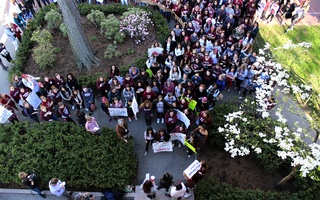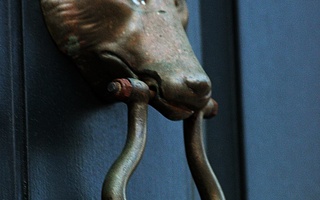In May 2016, ending months of speculation and meetings behind closed doors, the College announced an unprecedented policy penalizing members of single-gender social groups. The policy—Dean of the College Rakesh Khurana’s first major public proposal to regulate Harvard’s off-campus social groups—seemed to present a clear choice for Harvard’s final clubs and Greek organizations: go gender neutral, or have members face penalties.
One year later, however, with the sanctions set to take effect for the freshman class arriving on campus in August, only four of the 23 traditionally single-gender groups implicated by the policy have adopted gender neutral membership.
The process for each of these four clubs—the Seneca, Oak, Sab, and AEPi—and the Spee, which added women to their membership before the announcement of the sanctions, has varied significantly. While the Sab has actively pursued gender neutrality, other clubs, like the Seneca, have remained de facto single-gender. At another club, the all-male Fox, initial efforts to go gender neutral have stalled.{shortcode-374689d62774208eae567e17b7678ab0d023f8b7}
Most fraternities, sororities, and final clubs, however, have continued to hold out, even as the policy—which will bar members of such groups from leadership positions and coveted fellowships—is set to take effect for this fall’s incoming class of freshmen.
As a newly formed committee tasked with re-assessing the sanctions deliberates the future of the policy, the four gender neutral organizations, the 19 that have resisted change, and even some administrators are realizing that the fundamental shifts the sanctions hoped to effect will not come immediately.
“There’s just a lot of confusion about what’s actually happening,” Shub Chhokra ’18 said. “I think [students are] unsure about whether this policy will be implemented, or will there be changes in the policy.”
Chhokra is a member of the committee tasked with reviewing, and potentially replacing, the policy. That committee represents the latest installment in a multi-year saga defined by private conversations between administrators and club leaders, a contentious policy announcement followed by a highly-publicized backlash, faculty legislation targeting the sanctions, and an entirely separate committee tasked with hashing out the details of the original policy announcement.
All the while, most clubs have adopted a wait-and-see approach. Those that have taken action and changed membership policies, however, have had to contend with an administration they say cannot always offer them definitive answers.
When the previously all-female Sab Club elected to go gender neutral last semester, for instance, club leaders reiterated previously-expressed frustration with the administration.
“There’s been so much ambiguity and there continues to be so much ambiguity,” Eugenia B. Schraa ’04, a former Crimson editor and Sab Club graduate board member, said of the College’s administrators at the time. “In the end we went with what the undergrads feel deeply about their identity and that made it a bit easier than thinking about what the administration is really going to do.”
The Seneca organization, meanwhile, met with administrators several times before adopting gender neutral by-laws in August 2016—a shift from its charter calling for an all-female membership.
But in emails obtained by The Crimson, the Seneca told its members that Associate Dean of Students David R. Friedrich had assured the group in a May 2016 meeting that removing gender requirements from its charter and bylaws would allow the club to “continue to operate as it always has.”
“Like Women in Business or Latinas Unidas, although men may apply, our membership can be made up wholly of women without incurring the sanctions of the administration's new policy,” then-co-presidents of the Seneca Avni Nahar ’17 and Fran F. Swanson ’17 wrote at the time.{shortcode-aca47af6f2c8b6610979dfad10c066bbe799dc4d}
Current co-presidents of the Seneca Gita C. Abhiraman ’18 and Emma S. Schwartz ’18 added in an emailed statement to The Crimson that though the club’s current membership currently remains all-female, the club welcomes a “diverse group of applicants” to apply in the fall—including men.
According to Friedrich, the Seneca’s 501(c)(3) status distinguished it from clubs whose focus is solely social. The club’s mission, according to Abhiraman and Schwartz, is “to create opportunities, resources, and sustainable networks for women in social, educational, and professional environments.”
The publication of a committee report on implementing the College’s policy introduced further administrative designations for social groups, some of which students have called nebulous and vague.
The committee recommended that social groups seeking College recognition apply for designation as a “provisional student organization,” and be subject to a number of other requirements, including the publication of demographic data and reduction of financial barriers to participate. The committee also proposed a three to five year “bridge” program for female final clubs and sororities, allowing them to retain a “gender focused mission” while complying with the College’s policy.
Lulu S. Chua-Rubenfeld ’18, the Sab Club’s undergraduate president, said the the Sab—formerly called the Sablière Society—has not yet met with administrators about PSO or “bridge” status.
“Things are sort of still in limbo, and there hasn’t been a really defined road to becoming what the College wants us to be,” Chua-Rubenfeld said. “I don’t even know if they’re just happy with how we are now, but I would be open to reaching out to someone—I’m just not really sure what the process would be.”
AEPi President Jake H. Ascher ’19, meanwhile, said that he met with both Friedrich and Khurana about the provisional status.
“We would like to see our organization become a fully recognized organization on campus in the future,” Ascher said. “And we’re looking forward to getting the privileges that are associated with being a recognized organization.”
Though the Sab’s vote to go gender neutral passed with a two-thirds majority, some questions still remained for the group.
“I think you can have these fears going in—like how can this club that’s been only women for 15 years function if you just throw men into the mix?” Chua-Rubenfeld said.
The two previous final clubs that had moved away from single-gender membership offered distinct approaches.
The Spee, which became the first final club to adopt gender neutral membership in November 2015, had their female members undergo the same recruitment process as their male counterparts. The club did not dramatically change the punch—a club-specific term for a semester-long member selection process— to accommodate women, according to three people who went through the process.
{shortcode-c293e56b6d4a3ec3e1b944307fbb8166c2fbfa38}
The Fox, whose undergraduate membership attempted to add women to the club the same semester, chose to forego punch entirely for their new female members. Instead, they elected a select group of women directly in a process meant to “focus on the tradition and values of the Fox, while eliminating any activities with the potential to be ill-received by the female initiates,” according to a letter undergraduates sent to graduate members explaining their move.
Though the Fox graduate board eventually overturned the undergraduates’ decision, rendering the women’s membership “provisional,” the Sab’s approach resembled the Fox’s more than the Spee’s. This semester, the Sab elected 14 men into its ranks in anticipation of a gender neutral punch in the fall.
According to Chua-Rubenfeld, Sab leadership has prioritized adapting the club’s traditions to its new gender neutral membership.
“I think some of the traditions in punch will probably fall by the wayside,” she said. “We’re just trying to do more activities that would cater to a gender neutral environment and not just a specifically female environment.”
To aid in the transition, the club added men to its undergraduate board in interim elections this semester, appointing a male punchmaster and commencement chair to serve alongside female counterparts.
“We wanted men on board as soon as possible, because board is the gear behind the club, and we run the club and we make the decisions that will dictate punch and the future of the organization,” Chua-Rubenfeld said.
Samuel E. Beren ’19, the club’s new punchmaster, a member in charge of recruitment, said the Sab’s decision to elect men to the club’s leadership came in part from the example set by the Spee, which had recently elected a female vice-president.
“We definitely used [the Spee] as a good example,” Beren said. “Just talking to members of… the other co-ed clubs to get a sense of things they’ve done that have helped their transitions run smoothly.”
Several members of the Sab said the club’s efforts resulted in a smooth transition process.
“I think all the girls have done a really good job in making us feel welcome and not making us feel kind of like their ‘group of guys’ in a large group of girls,” Deven Hurt ’18, one of the Sab’s new male members, said.
Tynan Jackson ’19, a male Sab member, said he has recognized a “heightened consciousness of inclusivity” at the club.
Still, Hurt said that the Sab has strived to retain its identity as an organization of female empowerment while allowing people who are not female into its ranks.
“I think they did their best to retain the identity of what the Sab originally was, as kind of an artistic organization, as a feminist organization, but not necessarily as a feminine organization,” Hurt said.
In January, the all-male Oak Club also adopted gender neutral membership practices during its spring recruitment process after “a referendum in which a club-wide consensus was reached.”
The group conducted its first full-scale gender neutral recruitment process this spring, becoming the second all-male social club to go gender neutral during Khurana’s tenure. Oak president Jeremy D. Welborn ’18 did not respond to requests for comment on this story.
Similarly, members of the Harvard chapter of Alpha Epsilon Pi announced that the group would disaffiliate from its national umbrella organization and hold a gender neutral rush this fall.
Greek organizations are bound by the policies of national organizations, almost all of which mandate single-gender membership. For AEPi, complying with the policy was incompatible with remaining affiliated with their national fraternity.
Several undergraduate leaders of Harvard’s other fraternities did not respond to requests for comment.
Ascher, the AEPi president cited the policy as a major catalyst for making the change.
“We wanted to make a decision before the sanctions went into effect because we knew that it would be detrimental to our ability to recruit new people,” Ascher said.{shortcode-b091d16153b8b218d6f13a42eb0ddf2e2d2be1b1}
According to Ascher, the group is not planning on any major changes to their rush process this fall.
“I don’t think that much has to change, to be honest,” he said. “I think there’s just little things here and there with regard to the rush process, our pledge process, that we’re looking out for, thinking about, and definitely changing.”
The first class of freshmen to be affected by the sanctions will arrive this August to a campus with a social club scene in flux—comprised of a patchwork of single-gender and some gender neutral organizations.
Though more clubs than ever before went gender neutral this past semester, there’s no guarantee more will follow. Since August, undergraduate support among members of the Fox Club fell from 83 percent in favor of gender neutral membership to less than 50 percent in a non-binding vote in early May.
Many of the remaining single-gender clubs—most notably the Porcellian and the Fly—have vociferously opposed the College’s attempts to influence their membership policies. The Fly publicly announced in September 2016 that it had retained legal counsel.
According to Jackson, groups that became co-ed saw a change in their relationship with clubs that remain single-gender.
“There is sort of this weird dynamic between clubs, specifically male clubs that are not co-ed yet, and interacting with them in those spaces.” Jackson said. “In terms of the male members, it's still kind of like this weird vibe. In terms of, like, ‘How do we, as the male club, interact with the co-ed club?’ We’re still kind of on this confused ground.”
While some groups have communicated with each other to share lessons learned and strategies for navigating the changes to Harvard’s social landscape, each is charting its own course.
“I think it’s a really tough situation... it’s not easy to make this change to go gender neutral,” Ascher said. “It’s a lot harder than people may think.”
—Staff writer Graham Bishai can be reached at graham.bishai@thecrimson.com. Follow him on Twitter @GrahamBishai.
—Staff writer Derek G. Xiao can be reached at derek.xiao@thecrimson.com. Follow him on Twitter @derekgxiao.


